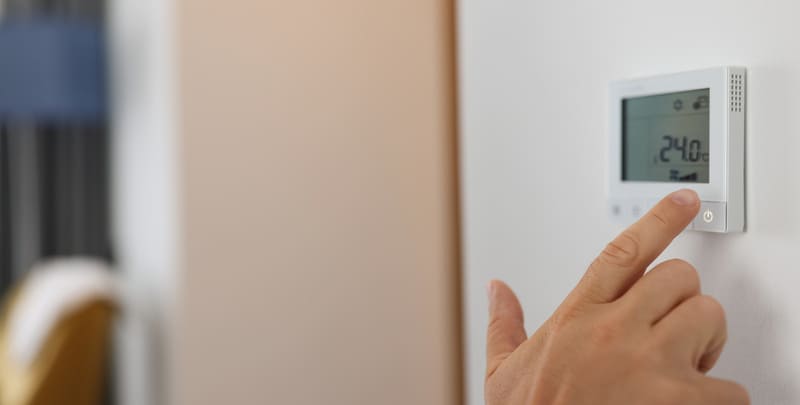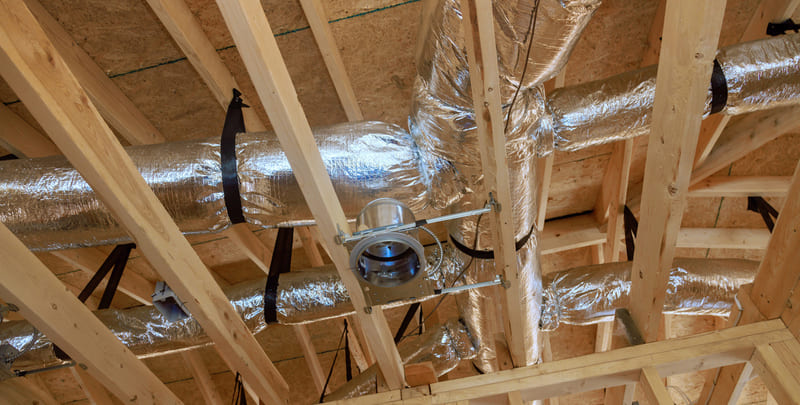Ducted air conditioning is a popular choice for homeowners seeking complete temperature control for their entire home. This type of air con offers a multitude of benefits, ranging from energy efficiency to zone control.
Let’s explore how ducted air conditioning works, the various components of the system, and how they all come together to provide the year-round precise temperature control you crave.
Ducted Air Conditioners: A Complete Climate Control Solution
Ducted air conditioning works by utilising a system of ducts, indoor units, and an outdoor unit to cool and heat a home efficiently. The climate control provided by ducted air cons ensures that every room in the house maintains a comfortable temperature, making it a preferred option for bigger homes where consistent temperature control is essential.
How Ducted Air Conditioning Works: The Basics
A ducted air conditioning system draws air from the home through a central return air grille. This air is then passed through a heat exchanger in the indoor unit, where it is cooled in the summer and heated in the winter. The conditioned air is then distributed to multiple rooms through a series of ducts running through the roof or ceiling.
As part of the ducted reverse cycle air conditioning process, a zone control system distributes the cooled or heated air into individual rooms or zones. This allows homeowners to manage the temperature in different rooms efficiently, ensuring optimal comfort and energy savings.
Ducted Air Conditioning Components
To understand how ducted air conditioning works fully, it is essential to explore the key components of the system:
Indoor Units
Indoor units, also known as air handlers, include a fan, a coil, and a filter. These units are typically installed in the ceiling or roof space and work together to condition the air that is drawn from the home.
Outdoor Units
The outdoor unit contains the compressor, condenser coil, and fan. This part of the ducted air conditioning system is responsible for transferring heat between the indoor and outdoor environments. It plays a crucial role in the cooling process, as it releases the heat extracted from the indoor air, helping maintain a comfortable temperature inside the home.
Ducts
Ducts are essential for distributing the conditioned air throughout the home. A combination of supply and return air ducts work together to ensure consistent and comfortable airflow, providing effective heating and cooling for the entire house.
Vents
Vents help channel the conditioned air into individual rooms. They are installed throughout the home, typically in the ceiling or floor, and play a vital role in keeping the entire home comfortable and well-ventilated.
Control Panel
The control panel, also known as the thermostat, allows homeowners to set and maintain the desired temperature for their ducted system. Some advanced control panels offer zone control, giving homeowners the ability to adjust the temperature for individual rooms throughout the entire home.

Benefits of Ducted Air Conditioning
There are numerous advantages to installing a ducted air con system in your home, ranging from complete climate control to energy efficiency:
Consistent Temperature Control
With a ducted air conditioning system, homeowners can maintain year-round comfort throughout the entire house.
Zone Control Capabilities
Ducted systems allow for zone control, enabling homeowners to customise the temperature in individual rooms for optimal efficiency and comfort.
Energy Efficiency
Due to their size and power, ducted systems can often be more energy-efficient than other types of air conditioners, helping homeowners save on energy costs in the long run.
Ducted Air Con System Installation and Maintenance
Proper installation and maintenance are crucial to the efficiency and longevity of your ducted air conditioning system. Expert installation ensures that your ducted air con systems are functional and set up to deliver optimal performance.
Regular maintenance is necessary to keep your ducted air con system running smoothly. It is recommended to have your air conditioning serviced at least once a year to guarantee its efficiency. During maintenance, a professional technician will perform tasks such as:
- Cleaning or replacing air filters
- Inspecting and cleaning ducts
- Checking for any refrigerant leaks
- Ensuring the proper function of the compressor, fan motor, and other components
A well-maintained ducted air conditioning system provides a more comfortable living environment. It also helps prolong the system’s lifespan and saves on energy costs.

Working with a Professional Service Provider
To ensure the best results, it’s essential to work with a professional service provider. A licensed and experienced technician can provide quality installation, maintenance, and repair services. They’ll ensure your ducted air con system operates at peak performance.
When searching for the right service provider, be sure to:
- Verify the provider’s licence and qualifications
- Look for reviews and testimonials from satisfied customers
- Ask for recommendations from friends, family, or neighbours
Using a reliable service provider guarantees that your ducted air conditioning system will be correctly installed, maintained, and repaired when needed. If you’re unsure where to find a trusted professional, look no further than Air Con Service Near Me. We are your local provider with a strong reputation.
Remember, proper installation and maintenance of your ducted air conditioning system play a vital role in its performance and longevity. Work with a skilled professional service provider to ensure your home stays comfortable year-round and that your investment in a ducted air con system remains cost-effective throughout its lifespan.
Enjoy Year-Round Comfort With a Reverse Cycle Ducted Air Conditioner
A ducted air conditioner is an excellent choice for homeowners seeking complete temperature control and energy efficiency. With the right system installed by a licensed professional, ducted air conditioning can ensure year-round comfort.
Please note: This information is provided for advice purposes only. Regulations differ from state to state, so please consult your local authorities or an industry professional before proceeding with any work. See our Terms & Conditions here.

